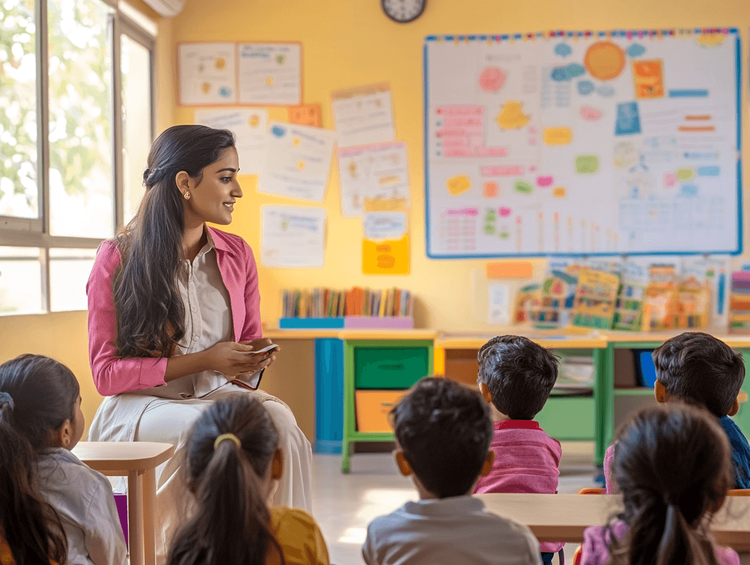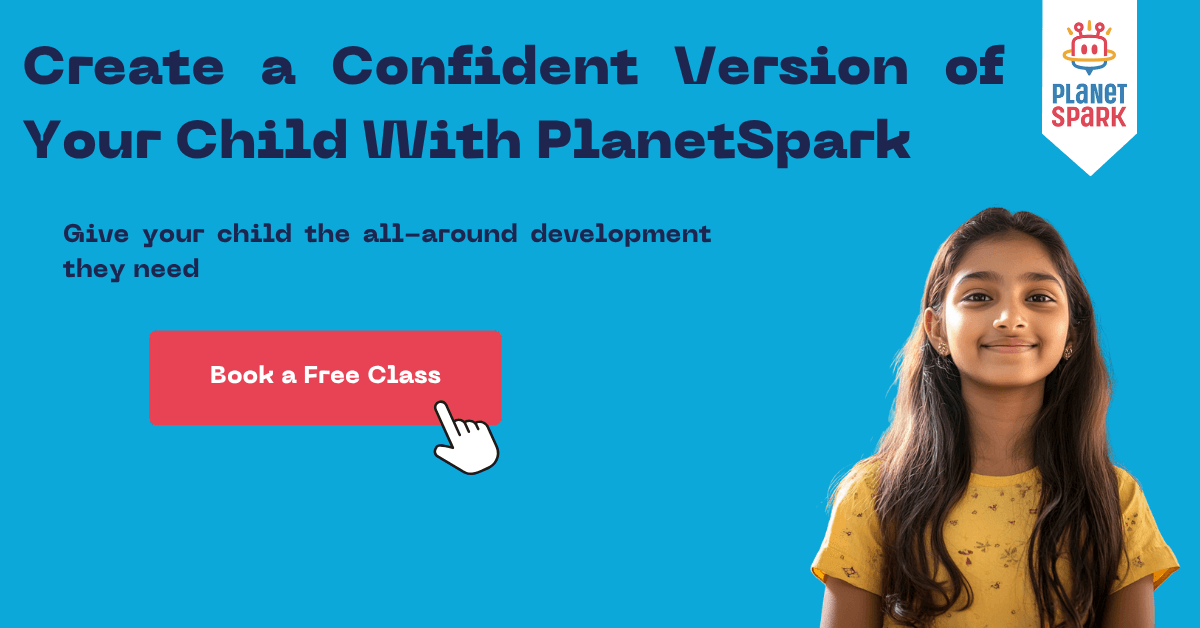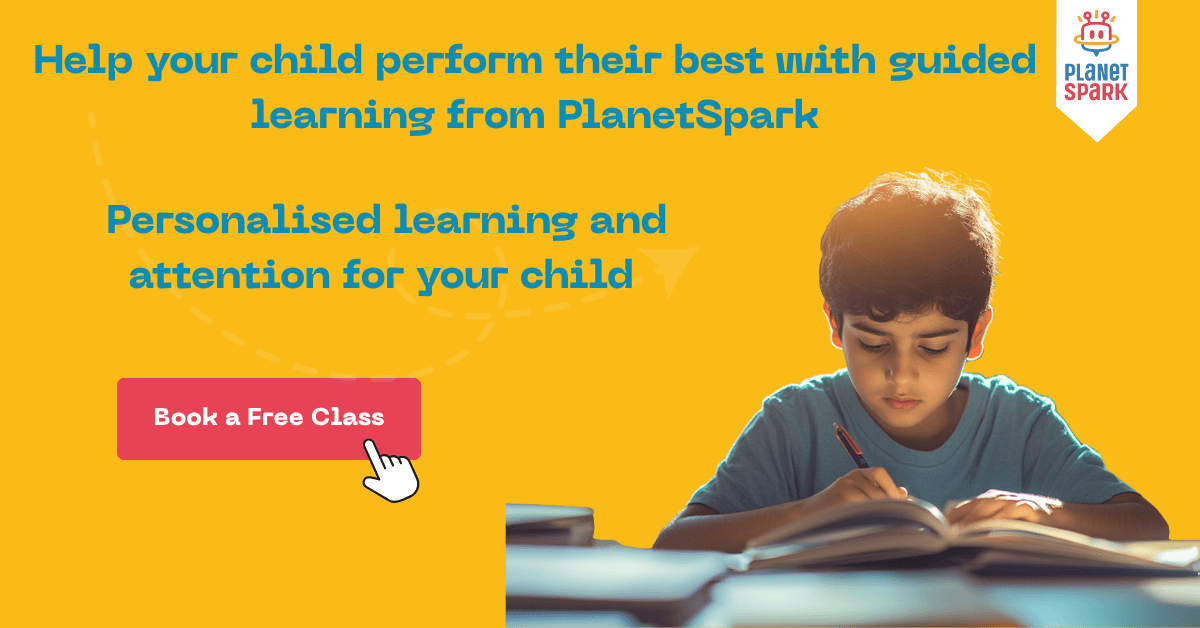Pedagogy and Development of Young Minds with PlanetSpark

Table of Contents
- What is Child Pedagogy?
- Importance of Understanding Child Development
- Child Development: Key Theories
- Stages of Child Development
- Core Concepts of Pedagogy
- Types of Educational Pedagogy
- Connection between Child Development and Pedagogy
- Challenges in Modern Child Pedagogy
- Work of Parents and Teachers in Child Development
- Holistic Child Development by PlanetSpark
- Tips for Parents and Teachers
- Summary
- FAQs
Our world is constantly in a state of rapid change, where the balanced growth and development of a child is quite complicated. The concept of understanding “child development and pedagogy” is highly required for anyone closely involved in rearing children. This is most required for individuals working as teachers, educational professionals, in collaboration with parents. PlanetSpark is an institution that has stepped into the sphere to simplify the concept of child psychology and pedagogy.
What is Child Pedagogy?
Child development is the biological, psychological, and emotional changes observed in children after birth up to the end of adolescence. These are inclusive of significant physical, mental, and social milestones. On the other hand, pedagogy is the art, science, and practice of teaching, which focuses on adapting teaching methods. It is done based on learning styles, psychological needs, and developmental stages of a child.
When brought together, child development and pedagogy are useful in providing educators and parents the chance to customise the child’s education. It helps fulfil all the requirements of the child holistically.
Importance of Understanding Child Development
The main reason for understanding the importance of child development can be realised with the following points:
- Identifying developmental delays at an early age
- Creating age-friendly learning strategies
- Improve adult-child relationships and communication
- Enhancing empathy and emotional intelligence
- Bolstering academic performance with tailored pedagogy
As PlanetSpark’s courses are based on a scientific approach to child development, they aid in children becoming critical thinkers and confident communicators. Register for a free trial class now!
Child Development: Key Theories
Educational planning is guided by the assistance of theoretical foundations. Some of the important ones have been mentioned below:
1. Piaget’s Cognitive Development Theory
According to Jean Piaget, children progress through four stages of cognitive development, which have been mentioned as follows:
- Sensorimotor (0 to 2 years)
- Preoperational (2 to 7 years)
- Concrete operational (7 to 11 years)
- Formal Operational (12+ years)
Each of the stages mentioned above helps understand the ways of how a child sees and interacts with the world around them.
2. Erikson’s Psychosocial Theory
Erik Erikson had outlined the eight stages of psychosocial development, which, for a child’s development, are:
- Trust vs Mistrust (Infancy)
- Autonomy vs Shame (Toddlerhood)
- Initiative vs Guilt (Preschool)
- Industry vs Inferiority (School Age)
3. Vygotsky’s Sociocultural Theory
According to Lev Vygotsky, the importance of social interaction in learning is based on his concept of the Zone of Proximal Development (ZPD). This theory has played an extremely important role in modern adaptations of pedagogy.
4. Howard Gardner’s Multiple Intelligences
According to Gardner, intelligence is not a single entity but is comprised of different types, including:
- Verbal-linguistic
- Logical-mathematical
- Bodily-kinesthetic
- Musical
- Interpersonal and more
The learning modules designed by PlanetSpark educators are planned in a way that appeals to varying levels of intelligence, ensuring that no child is left behind. Register for a free trial class now!
Stages of Child Development
Here is how a child develops across different stages:
Infancy (0–2 years)
- Rapid brain development
- Language starts forming
- Emotional bonding is critical
Early Childhood (3–6 years)
- Enhanced curiosity
- Language and motor skills improve
- Start understanding social norms
Middle Childhood (7–11 years)
- Develop logical thinking
- Form deeper friendships
- Begin understanding the consequences
Adolescence (12–18 years)
- Abstract reasoning develops
- Identity formation
- Strong influence of peer groups
Core Concepts of Pedagogy
A good pedagogical approach consists of the following central principles:
- A learner-centric approach mainly focuses on the pace and style of the child’s learning.
- The constructivist approach to pedagogy provides children with hands-on experiences in education.
- Inclusive education provides resources that are as diverse as the children who are being educated.
- Adapting lessons based on the ability of the student is the differentiated instruction pedagogy.
At PlanetSpark, the approach to pedagogy is personalized with one-on-one attention and adaptive learning environments. Register for a free trial class to see it firsthand!
Types of Educational Pedagogy
In the educational field, four different types of pedagogy are imparted to future teachers. These have been explained as follows:
Traditional Pedagogy
This form of pedagogy is teacher-centered, based on lectures, and has a uniform pace for all learners.
Progressive Pedagogy
Progressive pedagogy is centered around the child, based on activities and exploration with inquiries and collaboration between the teacher and learner.
Constructivist Pedagogy
When a teacher or educator uses constructivist pedagogy, they are often placing more importance on prior knowledge, self-discovery, and encouraging critical thought.
Blended Learning Pedagogy
With blended learning, traditional learning is combined with online tools, which encourages digital literacy and personalized learning paths.
At PlanetSpark, children are taught with a mix of blended and constructivist pedagogy, which guides them to become proactive learners.

Connection between Child Development and Pedagogy
Teaching methods must adapt to align with a child’s evolving stage. For example:
- A preschooler requires visual, tactile, and rhythmic prompts.
- Middle-schoolers benefit from explanations and experience collaborative peer-to-peer learning.
- Abstract concepts posed alongside discussions about their application in the real world challenge adolescents.
Educators who understand developmental milestones can tailor the right tools, tone, and timing, making learning easier and more enjoyable.
Challenges in Modern Child Pedagogy
Some of the most common difficulties observed in modern child pedagogy are as follows:
- Increased dependence on rote learning
- Parental pressure for academic excellence
- Ignoring the need for emotional development
- Increased screen time and digital distractions
- Forced usage of a one-size-fits-all teaching approach
When it comes to PlanetSpark’s approach to teaching, almost all of the aforementioned gaps are addressed. It is possible by making the learning process not only emotionally enriching but also by making it personalized and engaging.
Work of Parents and Teachers in Child Development
The duty of ensuring that the child has a wholesome development is the task of both parents and teachers. These can be done in the following ways:
Parents:
- Provide a safe and nurturing environment
- Inspire a sense of creativity and curiosity
- Establish a routine that aids learning
- Lower pressure and celebrate the smaller victories
Teacher’s Role
- Understand unique learning requirements
- Encourage inclusion-based classroom behaviour
- Regularly collaborate with parents
- Provide differentiated instruction
For any child’s well-rounded growth, both parents and teachers must work together as learning partners.

Holistic Child Development by PlanetSpark
PlanetSpark is not just for academics. It emphasizes:
a. Communication Skills: Children develop their articulation and confidence through debate, storytelling, podcasting, and public speaking.
b. Critical Thinking and Creativity: Children can think beyond textbooks thanks to live interactive sessions and real-world topics.
c. Developing Confidence: PlanetSpark's special stage-exposure activities equip children for obstacles they may face in the real world.
d. Personality Development: Classes aim to improve interpersonal, leadership, and emotional intelligence.
Tips for Parents and Teachers
Some of the most helpful tips for parents and teachers when it comes to child pedagogy and development are as follows:
- As children communicate with behaviour, it is therefore necessary to observe before reacting
- Achievements are as important as efforts, so both should be praised equally.
- Peer comparison can be detrimental to the mental development of a child
- Act the way you would want your child to behave in public spaces.
- Learning can be a fun, consistent habit when done correctly.
- Provide children with a safe space for expression.
Summary
Pedagogy and child development are not mutually exclusive concepts, as they both focus on important aspects of how a child is brought up and how they can be taught fruitfully. The collaborative effort between teachers and parents can create an empowered, educated, and empathetic child. Since educational requirements are a constantly changing goalpost, it is important to keep evolving as and when required. Platforms like PlanetSpark help both educators and parents to be assured that their child is prepared for exams and life equally.
FAQs
Q1. Do pedagogy and teaching have two unique meanings?
A: Pedagogy is the science and methodology created for teaching, whereas teaching is the act of providing valuable content to students. Pedagogy places more focus on the needs and requirements of a student.
Q2. Why is understanding child development important for teachers and educators?
A: Understanding child development is important for teachers as it helps in tailoring their teaching methods to address the needs of the child in terms of social, cognitive, and emotional stages. It helps in making the child’s learning more effective.
Q3. Does PlanetSpark help introverted children?
A: Yes, PlanetSpark’s personalized communication training builds confidence and expression skills, especially in shy or reserved children.
Q4. Which age group does PlanetSpark target for its educational programs?
A: PlanetSpark programs are designed for ages 4–16, with modules suited for various developmental stages.
Q5. How does PlanetSpark align with child development and pedagogy?
A: PlanetSpark teaches kids in a way that suits their age and learning style, using fun, interactive sessions that help them grow confidently at their own pace.
Personalized Communication Report
Record a video to get a AI generated personalized communication report for your child

Hi There, want to try these
tips for your child with
LIVE with our expert coach?
Let's check your child's
English fluency
